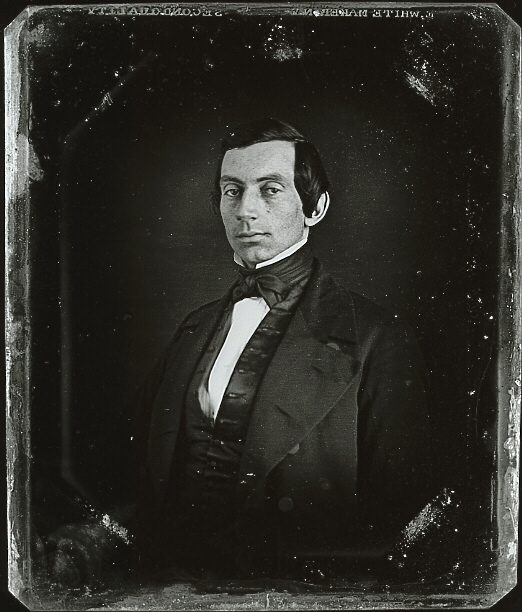 Poputonian at the Hullabaloo blog posted this photo of a daguerreotype whose owner apparently tried to auction it off as being of Abraham Lincoln without his beard. But apparently the authentication is much in doubt. Poputonian's two posts on it are Guess who? 02/12/07 and Lincoln Update 02/13/07. The daguerreotype has its own Web site, Daguerreotype of Young Abraham Lincoln, which also contains the text of an article cited as Abraham Lincoln's Organic & Emotional Neurosis by Edward J. Kempf, M.D. Wading River, N.Y., April 1952, Volume 67, Number 4 edition of the A.M.A. Archives of Neurology and Psychiatry, Pages 419-433. (Copyright 1952, American Medical Association).
Poputonian at the Hullabaloo blog posted this photo of a daguerreotype whose owner apparently tried to auction it off as being of Abraham Lincoln without his beard. But apparently the authentication is much in doubt. Poputonian's two posts on it are Guess who? 02/12/07 and Lincoln Update 02/13/07. The daguerreotype has its own Web site, Daguerreotype of Young Abraham Lincoln, which also contains the text of an article cited as Abraham Lincoln's Organic & Emotional Neurosis by Edward J. Kempf, M.D. Wading River, N.Y., April 1952, Volume 67, Number 4 edition of the A.M.A. Archives of Neurology and Psychiatry, Pages 419-433. (Copyright 1952, American Medical Association). The article contains at least a bit of what is technically called "smelly horse-poop". But more on that in a minute.
Lincoln biography in general is a field where angels (should) fear to tread. Not being an angelic type, I'm willing to take my chances on occasion. Lincoln's has been discussed a bit the last few days because Barack Obama built a tribute to Lincoln into his formal declaration of his Presidential candidacy. Cornel West apparently unloaded on Obama for giving Lincoln such positive press.
It's true that Lincoln had racist ideas, for instance, being a supporter of the boneheaded colonization scheme for sending freed blacks "back" to Africa. But Lincoln was also committed to the abolition cause, cautious though he was about the means. He preferred to get it done without civil war, though the slaveowners didn't allow that opportunity to be taken. And he did finally free the slaves (with limited exceptions) with the Emancipation Proclamation, supported the creation of black units of Union soldiers and led the Union to victory over the slaveowners' revolt known as the Confederacy. The African-American abolitionist Frederick Douglass, whose general outlook seems far more "normal" by today's standards than they did at the time, wrote very highly of Lincoln in his Autobiography and was deeply impressed by the respectful attitude Lincoln took with him in person. Douglass was very much a Lincoln supporter but didn't hesitate to push him toward emancipation and the use of black soldiers.
I've done a series of posts elsewhere on Lincoln as Abolitionist, based in large part on the argument in Antislavery Origins of the Civil War in the United States (1939) by Dwight Lowell Dumond. It's an older book but the argument holds up very well.
About the only white people in America who had attitudes toward race that look pretty much like today's theoretically mainstream notion were John Brown and his followers. Brown lived and worked with blacks in conditions as close to equality as you would have found pre-Civil War in the US. Even his attitudes toward women were radically egalitarian for the time. But even today, white people anyway are reluctant to sound like they approve of Brown's attitudes because he was a guerrilla fighter in Kansas and intended to set up a resistance network in the Appalachians in the slave states. And as part of the mini-civil war in "Bleeding Kansas" he also carried out several straight-up assassinations.
If there's anything to honor or respect in leaders of the pre-Civil War days who contributed in major ways to the development of American democracy, then we'll have to pick someone who's not a perfect democratic/egalitarian/non-violent saint. Because I don't really recall any Francis of Assisi's playing a big role in those days.
The Edward Kempf article
Getting back to 1952 article, I can't help wondering if it was mainly meant as a hit piece to bolster Lost Cause (pro-Confederate) ideology. The part early in the article where he tells use that Lincoln's facial creases are like those of "the great apes" and indicate "a primitive type of hereditary nervous differentiation" (whatever the heck that means) is kind of a screaming warning that some kind of crackpottery is at work.
The article identifies Kempf as being from New York. But that sentence sounds like something straight out of Deep South segregationist pseudo-genetics of the 1952 era: "Yeah, ole Abe Lincoln, he had a head shaped like one of them apes and that gave him a real primitive way of thankin'."
But, apart from the apparent pseudo-science influence, it's also an interesting instance of someone attempting a "psychohistory" without being careful about the limitations of the factual record. He seems to be on pretty good ground describing Lincoln's distinctive left eye misalignment. There were actual medical records to consult on that.
Which would mainly be of interest to Lincoln biographers and plastic surgeons, I would think.
But he makes some huge leaps of faith from facial features to character influences. And he's clearly sloppy with the sources on that count. Lincoln's "melancholy", which is generally assumed to be some form of depression, is well-known. But depression can have lots of influences and certainly various degrees of severity. And the author doesn't bother to establish the facts in that regard. Much less his assertion that Lincoln was "schizoid". (!!!)
Tags: abraham lincoln, young lincoln photo
No comments:
Post a Comment